Positivism in the High Court of Australia: Jurisprudence Essay, 2019
VerifiedAdded on 2022/11/28
|16
|4580
|118
Essay
AI Summary
This essay delves into the concept of positivism as a dominant jurisprudential theory within the High Court of Australia. It begins by defining positivism as a method of thought emphasizing rationalism and the discovery of fundamental laws to predict and manage future events, particularly within the context of jurisprudence and legal positivism. The essay then analyzes the theory's application in several key cases, including Australian Securities and Investments Commission v Kobelt [2019] HCA 18, where the court examined the interpretation of 'unconscionable conduct' in relation to the Australian Securities and Investments Commission Act, and Al-Kateb v Godwin [2004] HCA 37, which challenged the provisions of the Migration Act regarding administrative detention. The essay discusses how the court's decisions in these cases reflect a positivist approach, focusing on the literal interpretation of statutes rather than subjective notions of justice or fairness. The analysis provides a comprehensive understanding of the practical implications of positivism in Australian legal practice, offering insights into the court's approach to statutory interpretation and the broader implications for legal reasoning and outcomes. The essay also makes reference to Thomas v Mowbray [2007] HCA 33 233 CLR 307 to further illustrate the application of positivism within the High Court.
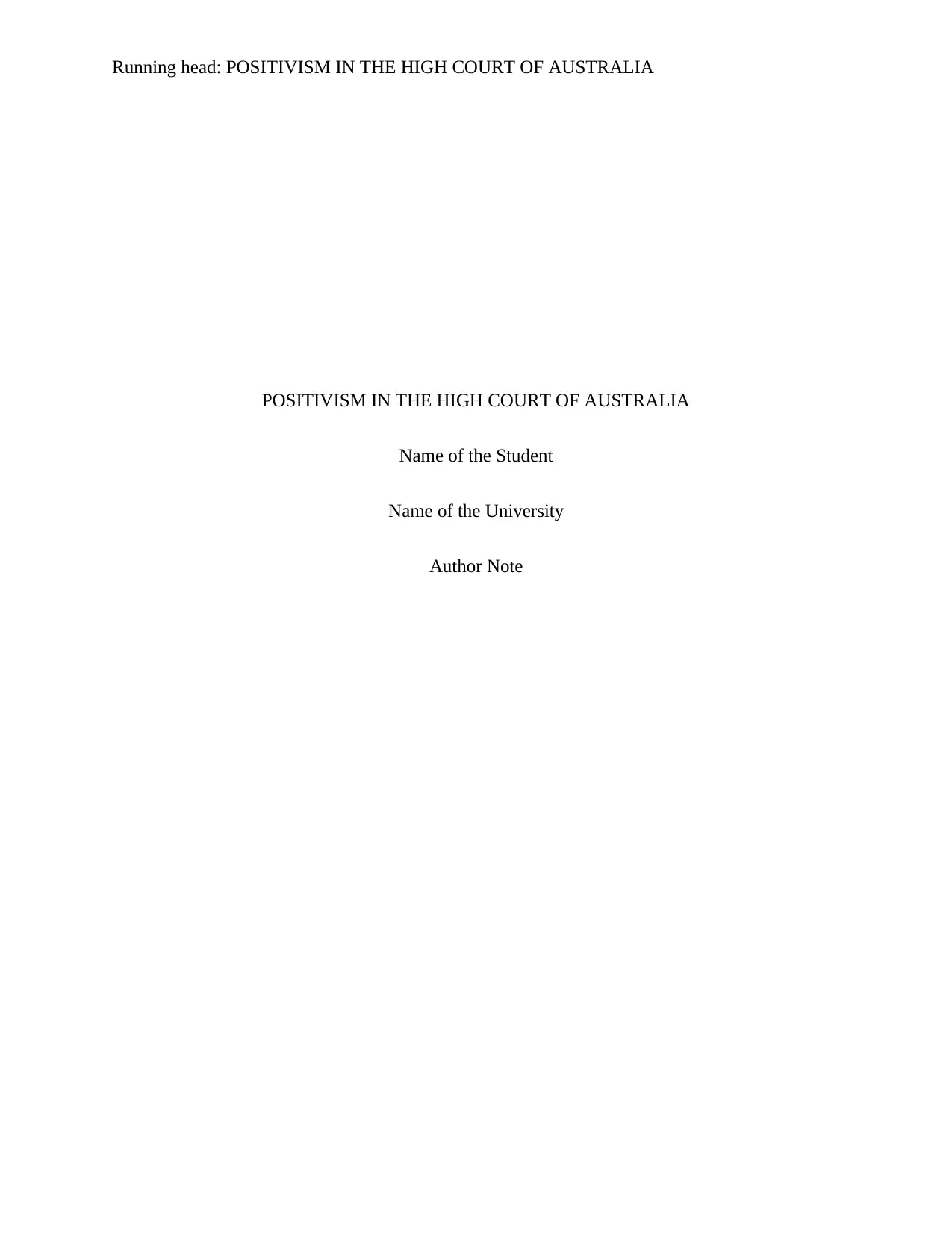
Running head: POSITIVISM IN THE HIGH COURT OF AUSTRALIA
POSITIVISM IN THE HIGH COURT OF AUSTRALIA
Name of the Student
Name of the University
Author Note
POSITIVISM IN THE HIGH COURT OF AUSTRALIA
Name of the Student
Name of the University
Author Note
Paraphrase This Document
Need a fresh take? Get an instant paraphrase of this document with our AI Paraphraser
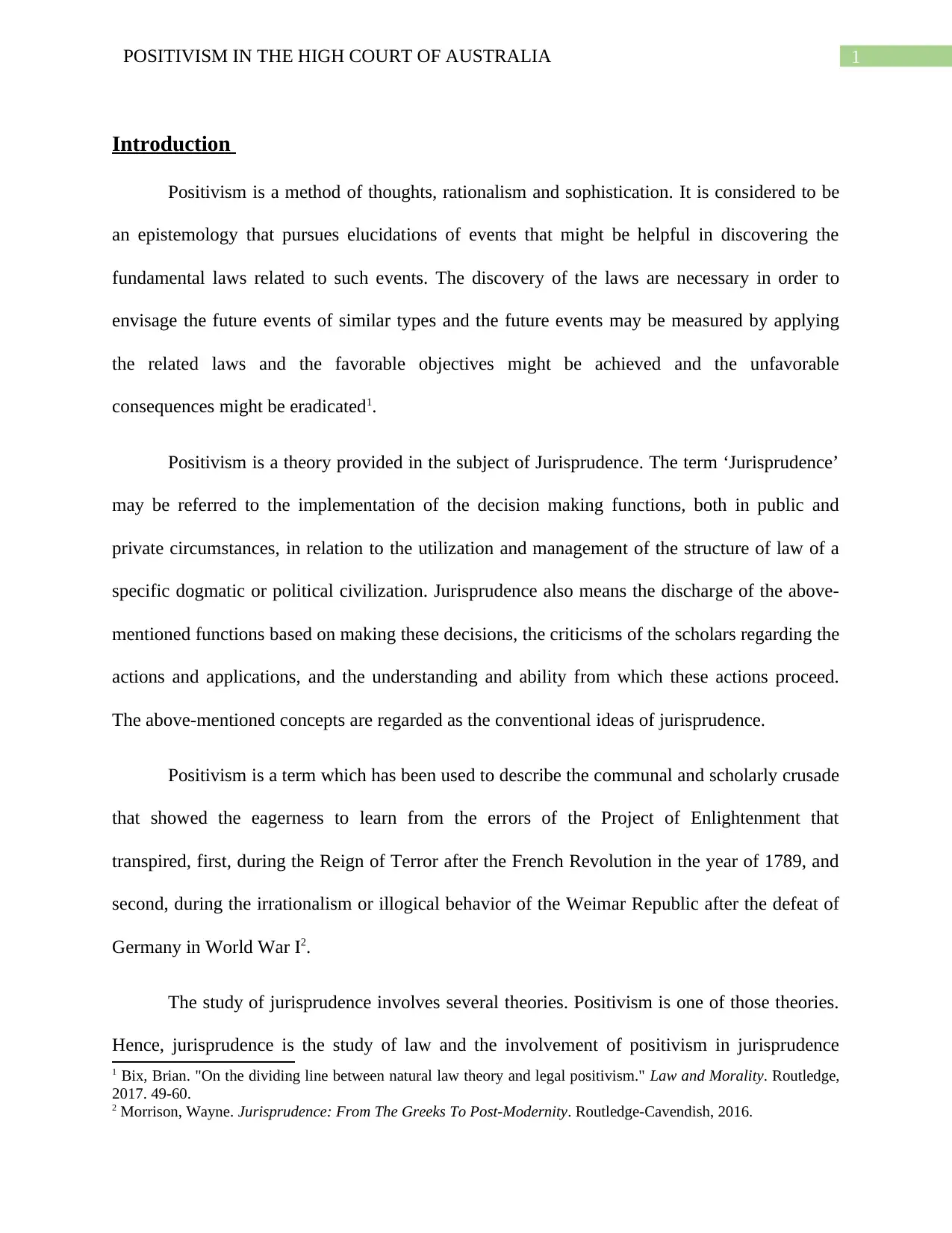
1POSITIVISM IN THE HIGH COURT OF AUSTRALIA
Introduction
Positivism is a method of thoughts, rationalism and sophistication. It is considered to be
an epistemology that pursues elucidations of events that might be helpful in discovering the
fundamental laws related to such events. The discovery of the laws are necessary in order to
envisage the future events of similar types and the future events may be measured by applying
the related laws and the favorable objectives might be achieved and the unfavorable
consequences might be eradicated1.
Positivism is a theory provided in the subject of Jurisprudence. The term ‘Jurisprudence’
may be referred to the implementation of the decision making functions, both in public and
private circumstances, in relation to the utilization and management of the structure of law of a
specific dogmatic or political civilization. Jurisprudence also means the discharge of the above-
mentioned functions based on making these decisions, the criticisms of the scholars regarding the
actions and applications, and the understanding and ability from which these actions proceed.
The above-mentioned concepts are regarded as the conventional ideas of jurisprudence.
Positivism is a term which has been used to describe the communal and scholarly crusade
that showed the eagerness to learn from the errors of the Project of Enlightenment that
transpired, first, during the Reign of Terror after the French Revolution in the year of 1789, and
second, during the irrationalism or illogical behavior of the Weimar Republic after the defeat of
Germany in World War I2.
The study of jurisprudence involves several theories. Positivism is one of those theories.
Hence, jurisprudence is the study of law and the involvement of positivism in jurisprudence
1 Bix, Brian. "On the dividing line between natural law theory and legal positivism." Law and Morality. Routledge,
2017. 49-60.
2 Morrison, Wayne. Jurisprudence: From The Greeks To Post-Modernity. Routledge-Cavendish, 2016.
Introduction
Positivism is a method of thoughts, rationalism and sophistication. It is considered to be
an epistemology that pursues elucidations of events that might be helpful in discovering the
fundamental laws related to such events. The discovery of the laws are necessary in order to
envisage the future events of similar types and the future events may be measured by applying
the related laws and the favorable objectives might be achieved and the unfavorable
consequences might be eradicated1.
Positivism is a theory provided in the subject of Jurisprudence. The term ‘Jurisprudence’
may be referred to the implementation of the decision making functions, both in public and
private circumstances, in relation to the utilization and management of the structure of law of a
specific dogmatic or political civilization. Jurisprudence also means the discharge of the above-
mentioned functions based on making these decisions, the criticisms of the scholars regarding the
actions and applications, and the understanding and ability from which these actions proceed.
The above-mentioned concepts are regarded as the conventional ideas of jurisprudence.
Positivism is a term which has been used to describe the communal and scholarly crusade
that showed the eagerness to learn from the errors of the Project of Enlightenment that
transpired, first, during the Reign of Terror after the French Revolution in the year of 1789, and
second, during the irrationalism or illogical behavior of the Weimar Republic after the defeat of
Germany in World War I2.
The study of jurisprudence involves several theories. Positivism is one of those theories.
Hence, jurisprudence is the study of law and the involvement of positivism in jurisprudence
1 Bix, Brian. "On the dividing line between natural law theory and legal positivism." Law and Morality. Routledge,
2017. 49-60.
2 Morrison, Wayne. Jurisprudence: From The Greeks To Post-Modernity. Routledge-Cavendish, 2016.
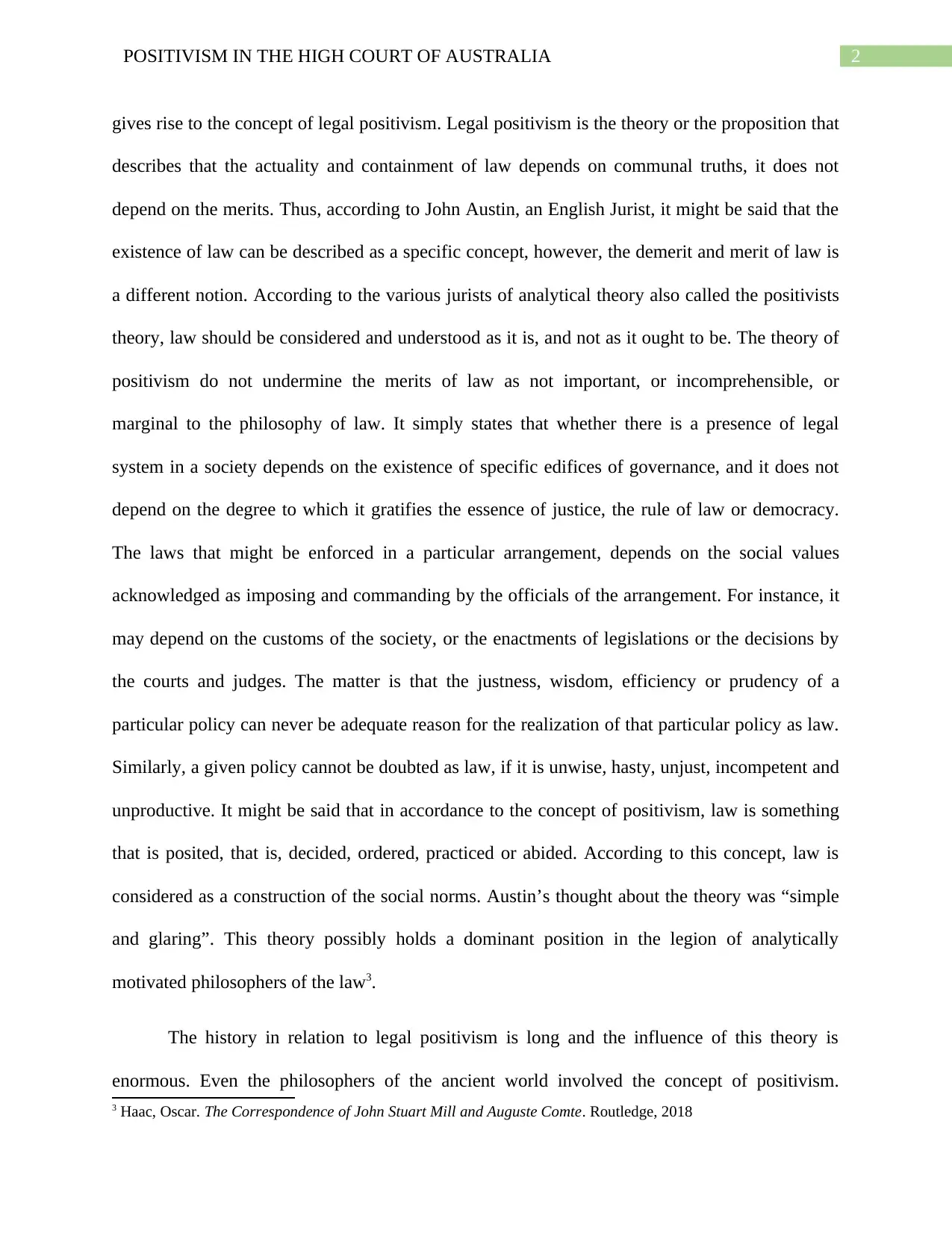
2POSITIVISM IN THE HIGH COURT OF AUSTRALIA
gives rise to the concept of legal positivism. Legal positivism is the theory or the proposition that
describes that the actuality and containment of law depends on communal truths, it does not
depend on the merits. Thus, according to John Austin, an English Jurist, it might be said that the
existence of law can be described as a specific concept, however, the demerit and merit of law is
a different notion. According to the various jurists of analytical theory also called the positivists
theory, law should be considered and understood as it is, and not as it ought to be. The theory of
positivism do not undermine the merits of law as not important, or incomprehensible, or
marginal to the philosophy of law. It simply states that whether there is a presence of legal
system in a society depends on the existence of specific edifices of governance, and it does not
depend on the degree to which it gratifies the essence of justice, the rule of law or democracy.
The laws that might be enforced in a particular arrangement, depends on the social values
acknowledged as imposing and commanding by the officials of the arrangement. For instance, it
may depend on the customs of the society, or the enactments of legislations or the decisions by
the courts and judges. The matter is that the justness, wisdom, efficiency or prudency of a
particular policy can never be adequate reason for the realization of that particular policy as law.
Similarly, a given policy cannot be doubted as law, if it is unwise, hasty, unjust, incompetent and
unproductive. It might be said that in accordance to the concept of positivism, law is something
that is posited, that is, decided, ordered, practiced or abided. According to this concept, law is
considered as a construction of the social norms. Austin’s thought about the theory was “simple
and glaring”. This theory possibly holds a dominant position in the legion of analytically
motivated philosophers of the law3.
The history in relation to legal positivism is long and the influence of this theory is
enormous. Even the philosophers of the ancient world involved the concept of positivism.
3 Haac, Oscar. The Correspondence of John Stuart Mill and Auguste Comte. Routledge, 2018
gives rise to the concept of legal positivism. Legal positivism is the theory or the proposition that
describes that the actuality and containment of law depends on communal truths, it does not
depend on the merits. Thus, according to John Austin, an English Jurist, it might be said that the
existence of law can be described as a specific concept, however, the demerit and merit of law is
a different notion. According to the various jurists of analytical theory also called the positivists
theory, law should be considered and understood as it is, and not as it ought to be. The theory of
positivism do not undermine the merits of law as not important, or incomprehensible, or
marginal to the philosophy of law. It simply states that whether there is a presence of legal
system in a society depends on the existence of specific edifices of governance, and it does not
depend on the degree to which it gratifies the essence of justice, the rule of law or democracy.
The laws that might be enforced in a particular arrangement, depends on the social values
acknowledged as imposing and commanding by the officials of the arrangement. For instance, it
may depend on the customs of the society, or the enactments of legislations or the decisions by
the courts and judges. The matter is that the justness, wisdom, efficiency or prudency of a
particular policy can never be adequate reason for the realization of that particular policy as law.
Similarly, a given policy cannot be doubted as law, if it is unwise, hasty, unjust, incompetent and
unproductive. It might be said that in accordance to the concept of positivism, law is something
that is posited, that is, decided, ordered, practiced or abided. According to this concept, law is
considered as a construction of the social norms. Austin’s thought about the theory was “simple
and glaring”. This theory possibly holds a dominant position in the legion of analytically
motivated philosophers of the law3.
The history in relation to legal positivism is long and the influence of this theory is
enormous. Even the philosophers of the ancient world involved the concept of positivism.
3 Haac, Oscar. The Correspondence of John Stuart Mill and Auguste Comte. Routledge, 2018
⊘ This is a preview!⊘
Do you want full access?
Subscribe today to unlock all pages.

Trusted by 1+ million students worldwide
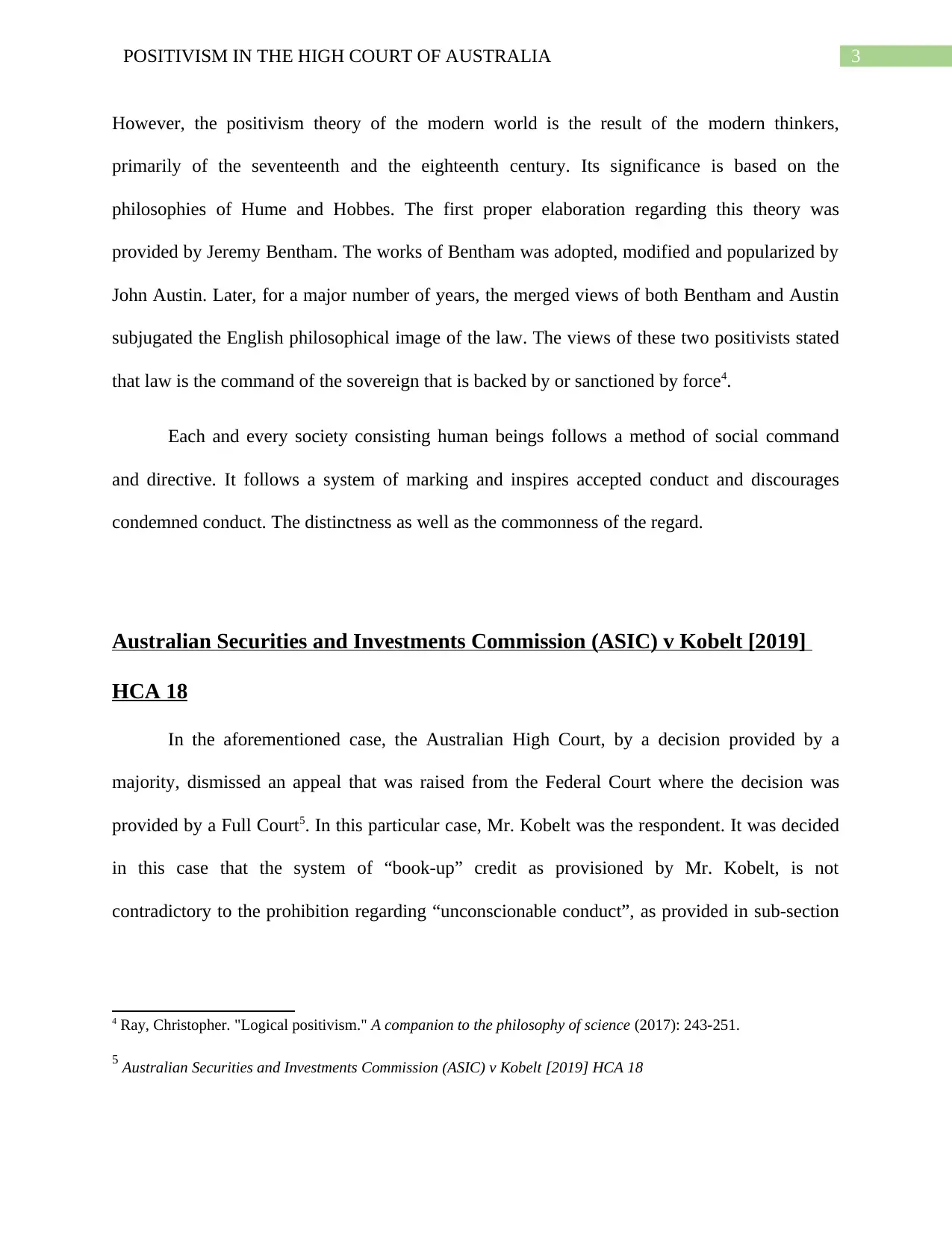
3POSITIVISM IN THE HIGH COURT OF AUSTRALIA
However, the positivism theory of the modern world is the result of the modern thinkers,
primarily of the seventeenth and the eighteenth century. Its significance is based on the
philosophies of Hume and Hobbes. The first proper elaboration regarding this theory was
provided by Jeremy Bentham. The works of Bentham was adopted, modified and popularized by
John Austin. Later, for a major number of years, the merged views of both Bentham and Austin
subjugated the English philosophical image of the law. The views of these two positivists stated
that law is the command of the sovereign that is backed by or sanctioned by force4.
Each and every society consisting human beings follows a method of social command
and directive. It follows a system of marking and inspires accepted conduct and discourages
condemned conduct. The distinctness as well as the commonness of the regard.
Australian Securities and Investments Commission (ASIC) v Kobelt [2019]
HCA 18
In the aforementioned case, the Australian High Court, by a decision provided by a
majority, dismissed an appeal that was raised from the Federal Court where the decision was
provided by a Full Court5. In this particular case, Mr. Kobelt was the respondent. It was decided
in this case that the system of “book-up” credit as provisioned by Mr. Kobelt, is not
contradictory to the prohibition regarding “unconscionable conduct”, as provided in sub-section
4 Ray, Christopher. "Logical positivism." A companion to the philosophy of science (2017): 243-251.
5 Australian Securities and Investments Commission (ASIC) v Kobelt [2019] HCA 18
However, the positivism theory of the modern world is the result of the modern thinkers,
primarily of the seventeenth and the eighteenth century. Its significance is based on the
philosophies of Hume and Hobbes. The first proper elaboration regarding this theory was
provided by Jeremy Bentham. The works of Bentham was adopted, modified and popularized by
John Austin. Later, for a major number of years, the merged views of both Bentham and Austin
subjugated the English philosophical image of the law. The views of these two positivists stated
that law is the command of the sovereign that is backed by or sanctioned by force4.
Each and every society consisting human beings follows a method of social command
and directive. It follows a system of marking and inspires accepted conduct and discourages
condemned conduct. The distinctness as well as the commonness of the regard.
Australian Securities and Investments Commission (ASIC) v Kobelt [2019]
HCA 18
In the aforementioned case, the Australian High Court, by a decision provided by a
majority, dismissed an appeal that was raised from the Federal Court where the decision was
provided by a Full Court5. In this particular case, Mr. Kobelt was the respondent. It was decided
in this case that the system of “book-up” credit as provisioned by Mr. Kobelt, is not
contradictory to the prohibition regarding “unconscionable conduct”, as provided in sub-section
4 Ray, Christopher. "Logical positivism." A companion to the philosophy of science (2017): 243-251.
5 Australian Securities and Investments Commission (ASIC) v Kobelt [2019] HCA 18
Paraphrase This Document
Need a fresh take? Get an instant paraphrase of this document with our AI Paraphraser
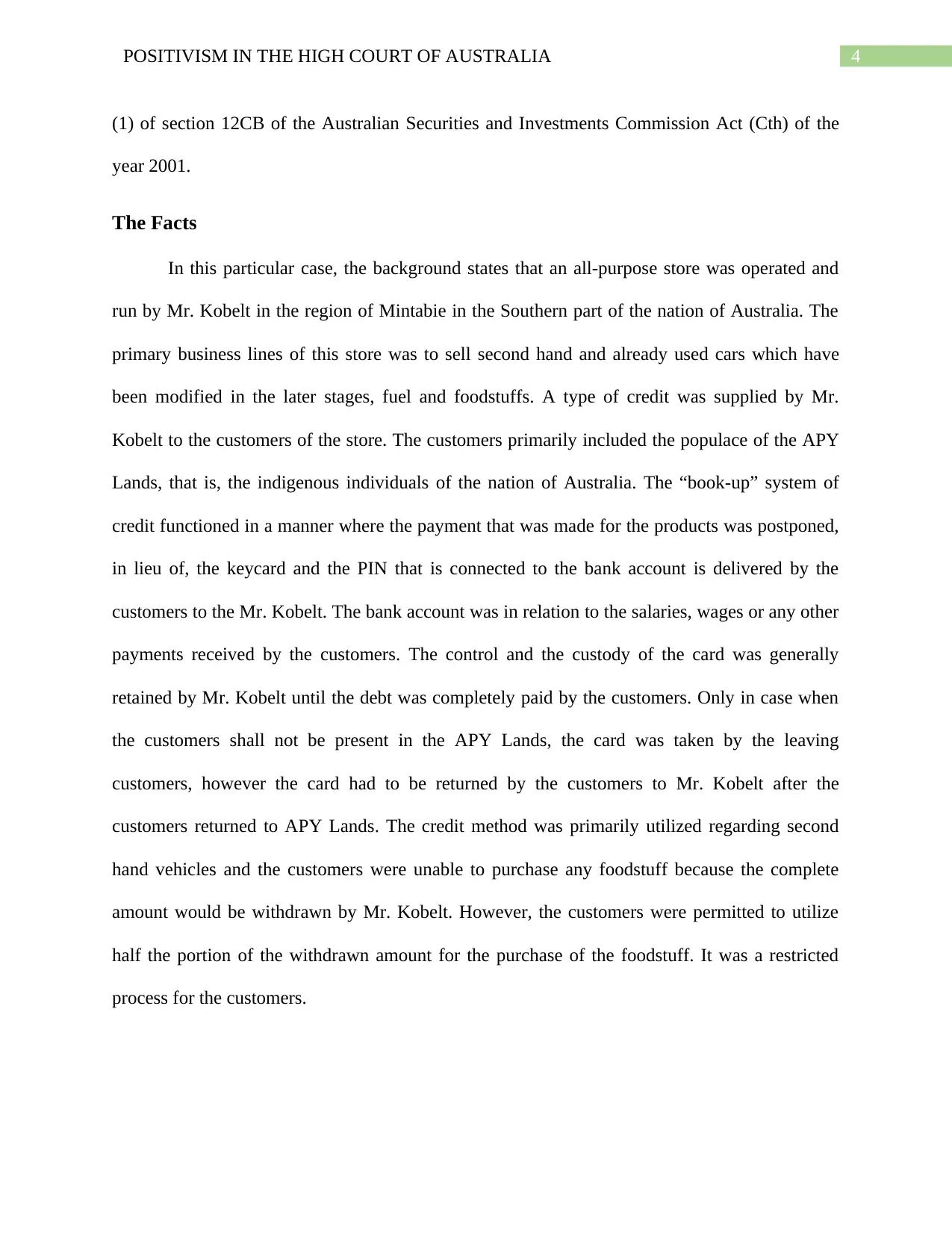
4POSITIVISM IN THE HIGH COURT OF AUSTRALIA
(1) of section 12CB of the Australian Securities and Investments Commission Act (Cth) of the
year 2001.
The Facts
In this particular case, the background states that an all-purpose store was operated and
run by Mr. Kobelt in the region of Mintabie in the Southern part of the nation of Australia. The
primary business lines of this store was to sell second hand and already used cars which have
been modified in the later stages, fuel and foodstuffs. A type of credit was supplied by Mr.
Kobelt to the customers of the store. The customers primarily included the populace of the APY
Lands, that is, the indigenous individuals of the nation of Australia. The “book-up” system of
credit functioned in a manner where the payment that was made for the products was postponed,
in lieu of, the keycard and the PIN that is connected to the bank account is delivered by the
customers to the Mr. Kobelt. The bank account was in relation to the salaries, wages or any other
payments received by the customers. The control and the custody of the card was generally
retained by Mr. Kobelt until the debt was completely paid by the customers. Only in case when
the customers shall not be present in the APY Lands, the card was taken by the leaving
customers, however the card had to be returned by the customers to Mr. Kobelt after the
customers returned to APY Lands. The credit method was primarily utilized regarding second
hand vehicles and the customers were unable to purchase any foodstuff because the complete
amount would be withdrawn by Mr. Kobelt. However, the customers were permitted to utilize
half the portion of the withdrawn amount for the purchase of the foodstuff. It was a restricted
process for the customers.
(1) of section 12CB of the Australian Securities and Investments Commission Act (Cth) of the
year 2001.
The Facts
In this particular case, the background states that an all-purpose store was operated and
run by Mr. Kobelt in the region of Mintabie in the Southern part of the nation of Australia. The
primary business lines of this store was to sell second hand and already used cars which have
been modified in the later stages, fuel and foodstuffs. A type of credit was supplied by Mr.
Kobelt to the customers of the store. The customers primarily included the populace of the APY
Lands, that is, the indigenous individuals of the nation of Australia. The “book-up” system of
credit functioned in a manner where the payment that was made for the products was postponed,
in lieu of, the keycard and the PIN that is connected to the bank account is delivered by the
customers to the Mr. Kobelt. The bank account was in relation to the salaries, wages or any other
payments received by the customers. The control and the custody of the card was generally
retained by Mr. Kobelt until the debt was completely paid by the customers. Only in case when
the customers shall not be present in the APY Lands, the card was taken by the leaving
customers, however the card had to be returned by the customers to Mr. Kobelt after the
customers returned to APY Lands. The credit method was primarily utilized regarding second
hand vehicles and the customers were unable to purchase any foodstuff because the complete
amount would be withdrawn by Mr. Kobelt. However, the customers were permitted to utilize
half the portion of the withdrawn amount for the purchase of the foodstuff. It was a restricted
process for the customers.
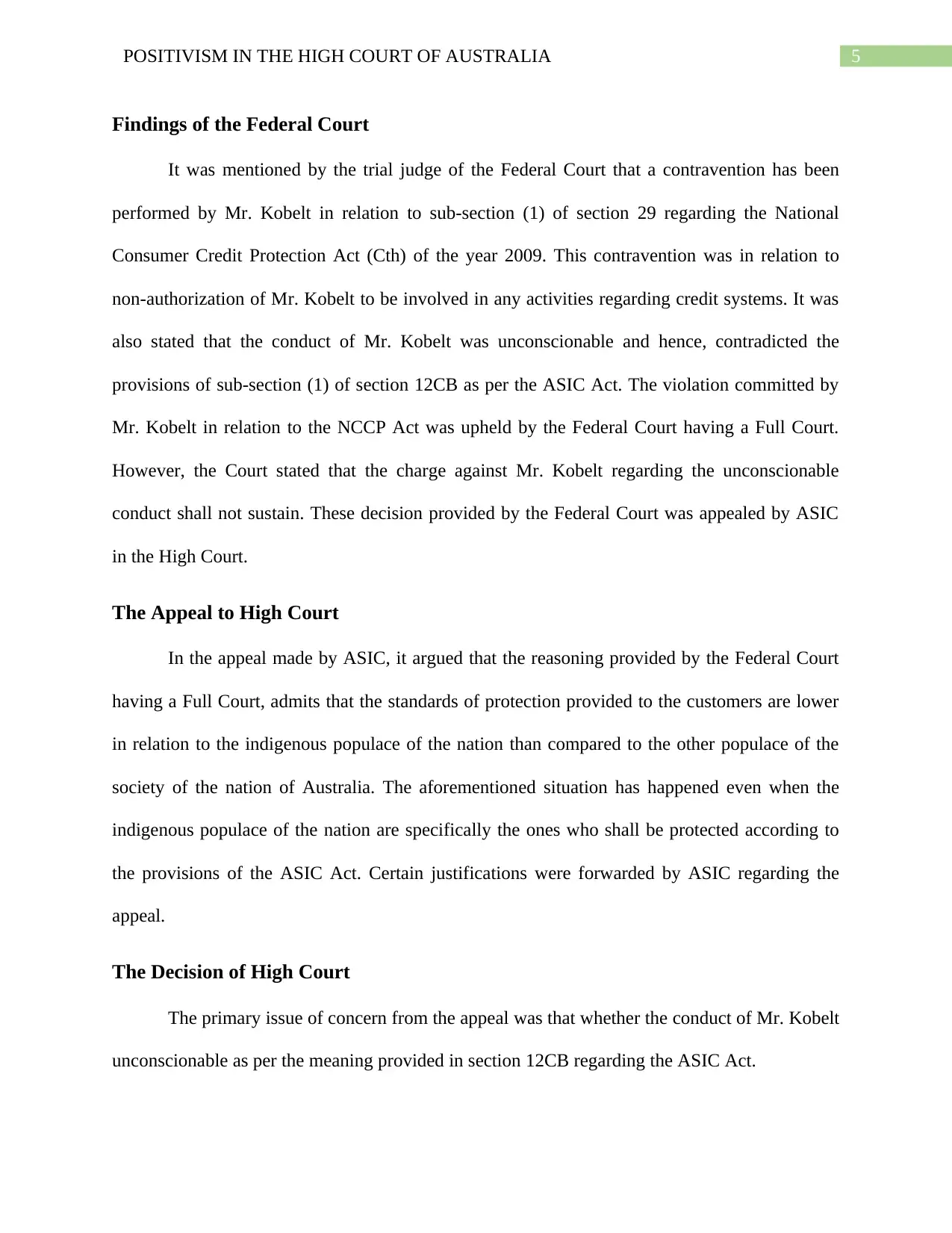
5POSITIVISM IN THE HIGH COURT OF AUSTRALIA
Findings of the Federal Court
It was mentioned by the trial judge of the Federal Court that a contravention has been
performed by Mr. Kobelt in relation to sub-section (1) of section 29 regarding the National
Consumer Credit Protection Act (Cth) of the year 2009. This contravention was in relation to
non-authorization of Mr. Kobelt to be involved in any activities regarding credit systems. It was
also stated that the conduct of Mr. Kobelt was unconscionable and hence, contradicted the
provisions of sub-section (1) of section 12CB as per the ASIC Act. The violation committed by
Mr. Kobelt in relation to the NCCP Act was upheld by the Federal Court having a Full Court.
However, the Court stated that the charge against Mr. Kobelt regarding the unconscionable
conduct shall not sustain. These decision provided by the Federal Court was appealed by ASIC
in the High Court.
The Appeal to High Court
In the appeal made by ASIC, it argued that the reasoning provided by the Federal Court
having a Full Court, admits that the standards of protection provided to the customers are lower
in relation to the indigenous populace of the nation than compared to the other populace of the
society of the nation of Australia. The aforementioned situation has happened even when the
indigenous populace of the nation are specifically the ones who shall be protected according to
the provisions of the ASIC Act. Certain justifications were forwarded by ASIC regarding the
appeal.
The Decision of High Court
The primary issue of concern from the appeal was that whether the conduct of Mr. Kobelt
unconscionable as per the meaning provided in section 12CB regarding the ASIC Act.
Findings of the Federal Court
It was mentioned by the trial judge of the Federal Court that a contravention has been
performed by Mr. Kobelt in relation to sub-section (1) of section 29 regarding the National
Consumer Credit Protection Act (Cth) of the year 2009. This contravention was in relation to
non-authorization of Mr. Kobelt to be involved in any activities regarding credit systems. It was
also stated that the conduct of Mr. Kobelt was unconscionable and hence, contradicted the
provisions of sub-section (1) of section 12CB as per the ASIC Act. The violation committed by
Mr. Kobelt in relation to the NCCP Act was upheld by the Federal Court having a Full Court.
However, the Court stated that the charge against Mr. Kobelt regarding the unconscionable
conduct shall not sustain. These decision provided by the Federal Court was appealed by ASIC
in the High Court.
The Appeal to High Court
In the appeal made by ASIC, it argued that the reasoning provided by the Federal Court
having a Full Court, admits that the standards of protection provided to the customers are lower
in relation to the indigenous populace of the nation than compared to the other populace of the
society of the nation of Australia. The aforementioned situation has happened even when the
indigenous populace of the nation are specifically the ones who shall be protected according to
the provisions of the ASIC Act. Certain justifications were forwarded by ASIC regarding the
appeal.
The Decision of High Court
The primary issue of concern from the appeal was that whether the conduct of Mr. Kobelt
unconscionable as per the meaning provided in section 12CB regarding the ASIC Act.
⊘ This is a preview!⊘
Do you want full access?
Subscribe today to unlock all pages.

Trusted by 1+ million students worldwide
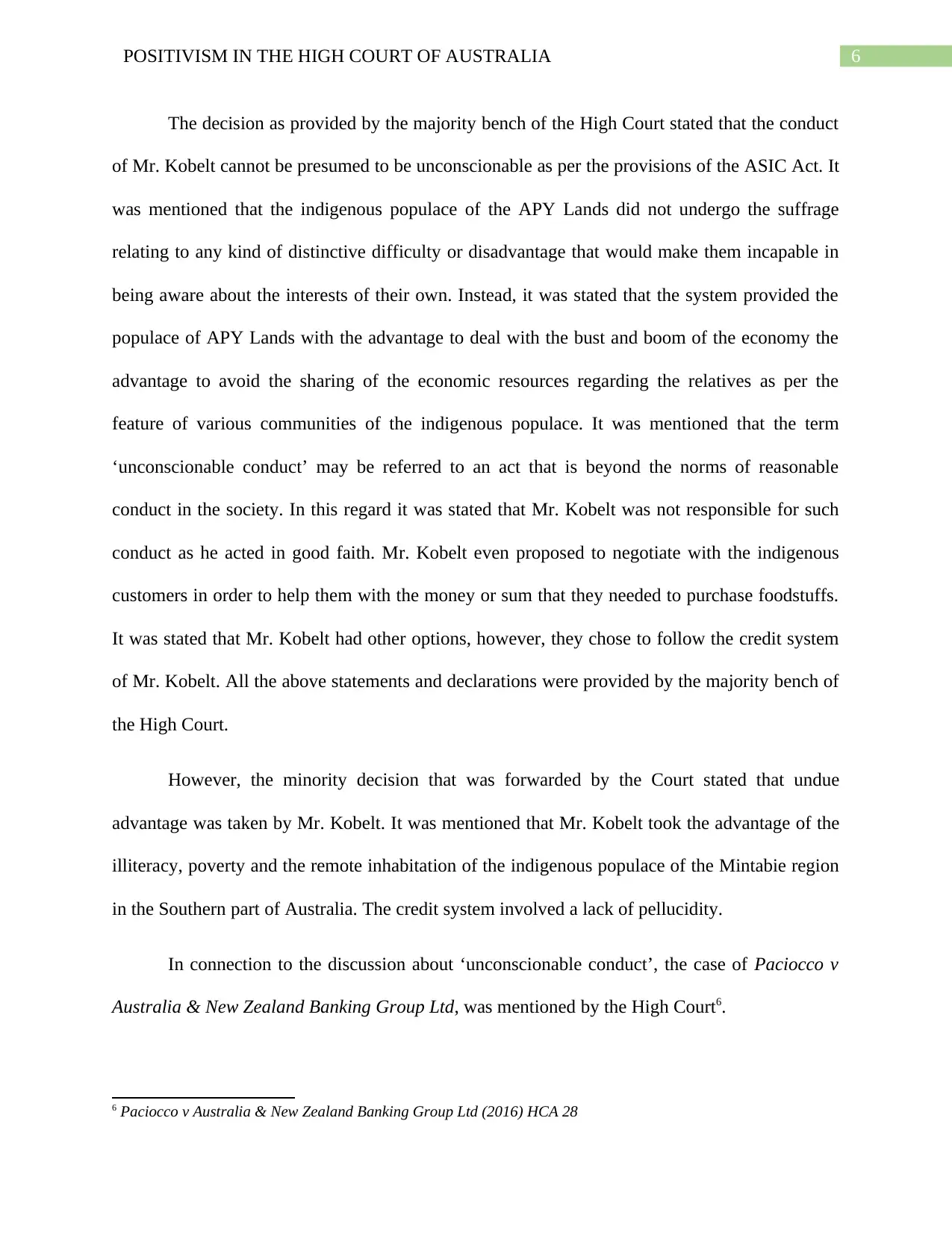
6POSITIVISM IN THE HIGH COURT OF AUSTRALIA
The decision as provided by the majority bench of the High Court stated that the conduct
of Mr. Kobelt cannot be presumed to be unconscionable as per the provisions of the ASIC Act. It
was mentioned that the indigenous populace of the APY Lands did not undergo the suffrage
relating to any kind of distinctive difficulty or disadvantage that would make them incapable in
being aware about the interests of their own. Instead, it was stated that the system provided the
populace of APY Lands with the advantage to deal with the bust and boom of the economy the
advantage to avoid the sharing of the economic resources regarding the relatives as per the
feature of various communities of the indigenous populace. It was mentioned that the term
‘unconscionable conduct’ may be referred to an act that is beyond the norms of reasonable
conduct in the society. In this regard it was stated that Mr. Kobelt was not responsible for such
conduct as he acted in good faith. Mr. Kobelt even proposed to negotiate with the indigenous
customers in order to help them with the money or sum that they needed to purchase foodstuffs.
It was stated that Mr. Kobelt had other options, however, they chose to follow the credit system
of Mr. Kobelt. All the above statements and declarations were provided by the majority bench of
the High Court.
However, the minority decision that was forwarded by the Court stated that undue
advantage was taken by Mr. Kobelt. It was mentioned that Mr. Kobelt took the advantage of the
illiteracy, poverty and the remote inhabitation of the indigenous populace of the Mintabie region
in the Southern part of Australia. The credit system involved a lack of pellucidity.
In connection to the discussion about ‘unconscionable conduct’, the case of Paciocco v
Australia & New Zealand Banking Group Ltd, was mentioned by the High Court6.
6 Paciocco v Australia & New Zealand Banking Group Ltd (2016) HCA 28
The decision as provided by the majority bench of the High Court stated that the conduct
of Mr. Kobelt cannot be presumed to be unconscionable as per the provisions of the ASIC Act. It
was mentioned that the indigenous populace of the APY Lands did not undergo the suffrage
relating to any kind of distinctive difficulty or disadvantage that would make them incapable in
being aware about the interests of their own. Instead, it was stated that the system provided the
populace of APY Lands with the advantage to deal with the bust and boom of the economy the
advantage to avoid the sharing of the economic resources regarding the relatives as per the
feature of various communities of the indigenous populace. It was mentioned that the term
‘unconscionable conduct’ may be referred to an act that is beyond the norms of reasonable
conduct in the society. In this regard it was stated that Mr. Kobelt was not responsible for such
conduct as he acted in good faith. Mr. Kobelt even proposed to negotiate with the indigenous
customers in order to help them with the money or sum that they needed to purchase foodstuffs.
It was stated that Mr. Kobelt had other options, however, they chose to follow the credit system
of Mr. Kobelt. All the above statements and declarations were provided by the majority bench of
the High Court.
However, the minority decision that was forwarded by the Court stated that undue
advantage was taken by Mr. Kobelt. It was mentioned that Mr. Kobelt took the advantage of the
illiteracy, poverty and the remote inhabitation of the indigenous populace of the Mintabie region
in the Southern part of Australia. The credit system involved a lack of pellucidity.
In connection to the discussion about ‘unconscionable conduct’, the case of Paciocco v
Australia & New Zealand Banking Group Ltd, was mentioned by the High Court6.
6 Paciocco v Australia & New Zealand Banking Group Ltd (2016) HCA 28
Paraphrase This Document
Need a fresh take? Get an instant paraphrase of this document with our AI Paraphraser
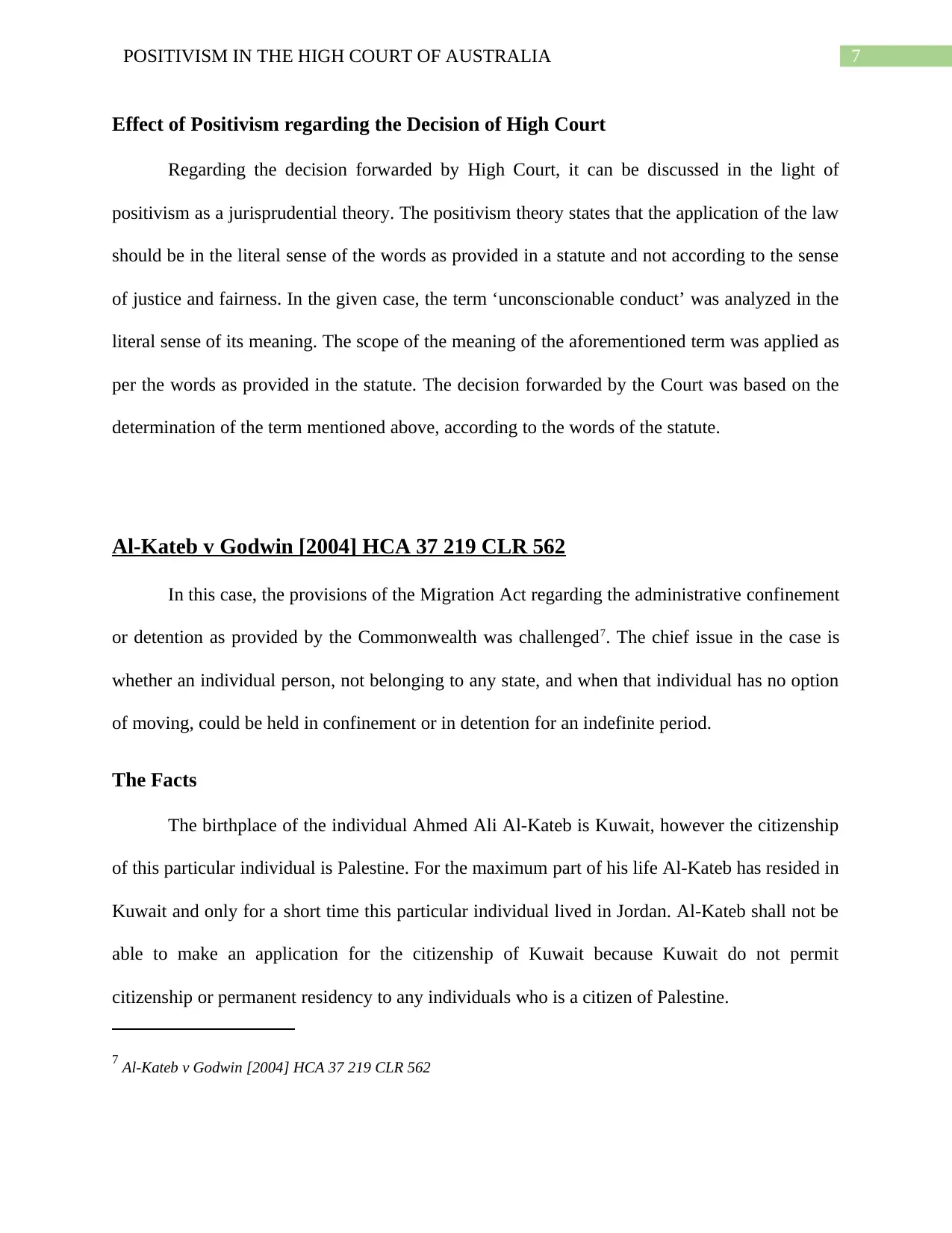
7POSITIVISM IN THE HIGH COURT OF AUSTRALIA
Effect of Positivism regarding the Decision of High Court
Regarding the decision forwarded by High Court, it can be discussed in the light of
positivism as a jurisprudential theory. The positivism theory states that the application of the law
should be in the literal sense of the words as provided in a statute and not according to the sense
of justice and fairness. In the given case, the term ‘unconscionable conduct’ was analyzed in the
literal sense of its meaning. The scope of the meaning of the aforementioned term was applied as
per the words as provided in the statute. The decision forwarded by the Court was based on the
determination of the term mentioned above, according to the words of the statute.
Al-Kateb v Godwin [2004] HCA 37 219 CLR 562
In this case, the provisions of the Migration Act regarding the administrative confinement
or detention as provided by the Commonwealth was challenged7. The chief issue in the case is
whether an individual person, not belonging to any state, and when that individual has no option
of moving, could be held in confinement or in detention for an indefinite period.
The Facts
The birthplace of the individual Ahmed Ali Al-Kateb is Kuwait, however the citizenship
of this particular individual is Palestine. For the maximum part of his life Al-Kateb has resided in
Kuwait and only for a short time this particular individual lived in Jordan. Al-Kateb shall not be
able to make an application for the citizenship of Kuwait because Kuwait do not permit
citizenship or permanent residency to any individuals who is a citizen of Palestine.
7 Al-Kateb v Godwin [2004] HCA 37 219 CLR 562
Effect of Positivism regarding the Decision of High Court
Regarding the decision forwarded by High Court, it can be discussed in the light of
positivism as a jurisprudential theory. The positivism theory states that the application of the law
should be in the literal sense of the words as provided in a statute and not according to the sense
of justice and fairness. In the given case, the term ‘unconscionable conduct’ was analyzed in the
literal sense of its meaning. The scope of the meaning of the aforementioned term was applied as
per the words as provided in the statute. The decision forwarded by the Court was based on the
determination of the term mentioned above, according to the words of the statute.
Al-Kateb v Godwin [2004] HCA 37 219 CLR 562
In this case, the provisions of the Migration Act regarding the administrative confinement
or detention as provided by the Commonwealth was challenged7. The chief issue in the case is
whether an individual person, not belonging to any state, and when that individual has no option
of moving, could be held in confinement or in detention for an indefinite period.
The Facts
The birthplace of the individual Ahmed Ali Al-Kateb is Kuwait, however the citizenship
of this particular individual is Palestine. For the maximum part of his life Al-Kateb has resided in
Kuwait and only for a short time this particular individual lived in Jordan. Al-Kateb shall not be
able to make an application for the citizenship of Kuwait because Kuwait do not permit
citizenship or permanent residency to any individuals who is a citizen of Palestine.
7 Al-Kateb v Godwin [2004] HCA 37 219 CLR 562
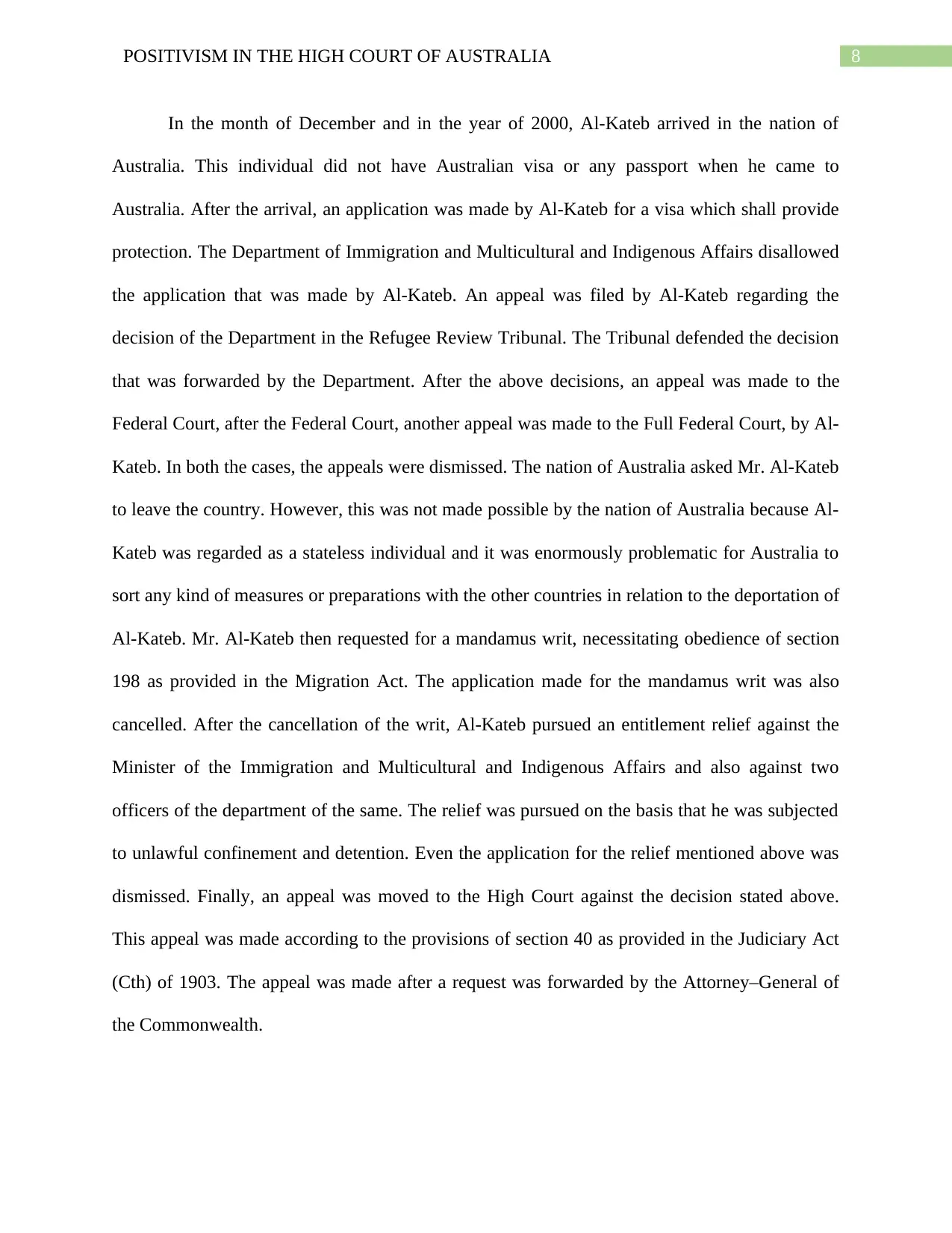
8POSITIVISM IN THE HIGH COURT OF AUSTRALIA
In the month of December and in the year of 2000, Al-Kateb arrived in the nation of
Australia. This individual did not have Australian visa or any passport when he came to
Australia. After the arrival, an application was made by Al-Kateb for a visa which shall provide
protection. The Department of Immigration and Multicultural and Indigenous Affairs disallowed
the application that was made by Al-Kateb. An appeal was filed by Al-Kateb regarding the
decision of the Department in the Refugee Review Tribunal. The Tribunal defended the decision
that was forwarded by the Department. After the above decisions, an appeal was made to the
Federal Court, after the Federal Court, another appeal was made to the Full Federal Court, by Al-
Kateb. In both the cases, the appeals were dismissed. The nation of Australia asked Mr. Al-Kateb
to leave the country. However, this was not made possible by the nation of Australia because Al-
Kateb was regarded as a stateless individual and it was enormously problematic for Australia to
sort any kind of measures or preparations with the other countries in relation to the deportation of
Al-Kateb. Mr. Al-Kateb then requested for a mandamus writ, necessitating obedience of section
198 as provided in the Migration Act. The application made for the mandamus writ was also
cancelled. After the cancellation of the writ, Al-Kateb pursued an entitlement relief against the
Minister of the Immigration and Multicultural and Indigenous Affairs and also against two
officers of the department of the same. The relief was pursued on the basis that he was subjected
to unlawful confinement and detention. Even the application for the relief mentioned above was
dismissed. Finally, an appeal was moved to the High Court against the decision stated above.
This appeal was made according to the provisions of section 40 as provided in the Judiciary Act
(Cth) of 1903. The appeal was made after a request was forwarded by the Attorney–General of
the Commonwealth.
In the month of December and in the year of 2000, Al-Kateb arrived in the nation of
Australia. This individual did not have Australian visa or any passport when he came to
Australia. After the arrival, an application was made by Al-Kateb for a visa which shall provide
protection. The Department of Immigration and Multicultural and Indigenous Affairs disallowed
the application that was made by Al-Kateb. An appeal was filed by Al-Kateb regarding the
decision of the Department in the Refugee Review Tribunal. The Tribunal defended the decision
that was forwarded by the Department. After the above decisions, an appeal was made to the
Federal Court, after the Federal Court, another appeal was made to the Full Federal Court, by Al-
Kateb. In both the cases, the appeals were dismissed. The nation of Australia asked Mr. Al-Kateb
to leave the country. However, this was not made possible by the nation of Australia because Al-
Kateb was regarded as a stateless individual and it was enormously problematic for Australia to
sort any kind of measures or preparations with the other countries in relation to the deportation of
Al-Kateb. Mr. Al-Kateb then requested for a mandamus writ, necessitating obedience of section
198 as provided in the Migration Act. The application made for the mandamus writ was also
cancelled. After the cancellation of the writ, Al-Kateb pursued an entitlement relief against the
Minister of the Immigration and Multicultural and Indigenous Affairs and also against two
officers of the department of the same. The relief was pursued on the basis that he was subjected
to unlawful confinement and detention. Even the application for the relief mentioned above was
dismissed. Finally, an appeal was moved to the High Court against the decision stated above.
This appeal was made according to the provisions of section 40 as provided in the Judiciary Act
(Cth) of 1903. The appeal was made after a request was forwarded by the Attorney–General of
the Commonwealth.
⊘ This is a preview!⊘
Do you want full access?
Subscribe today to unlock all pages.

Trusted by 1+ million students worldwide
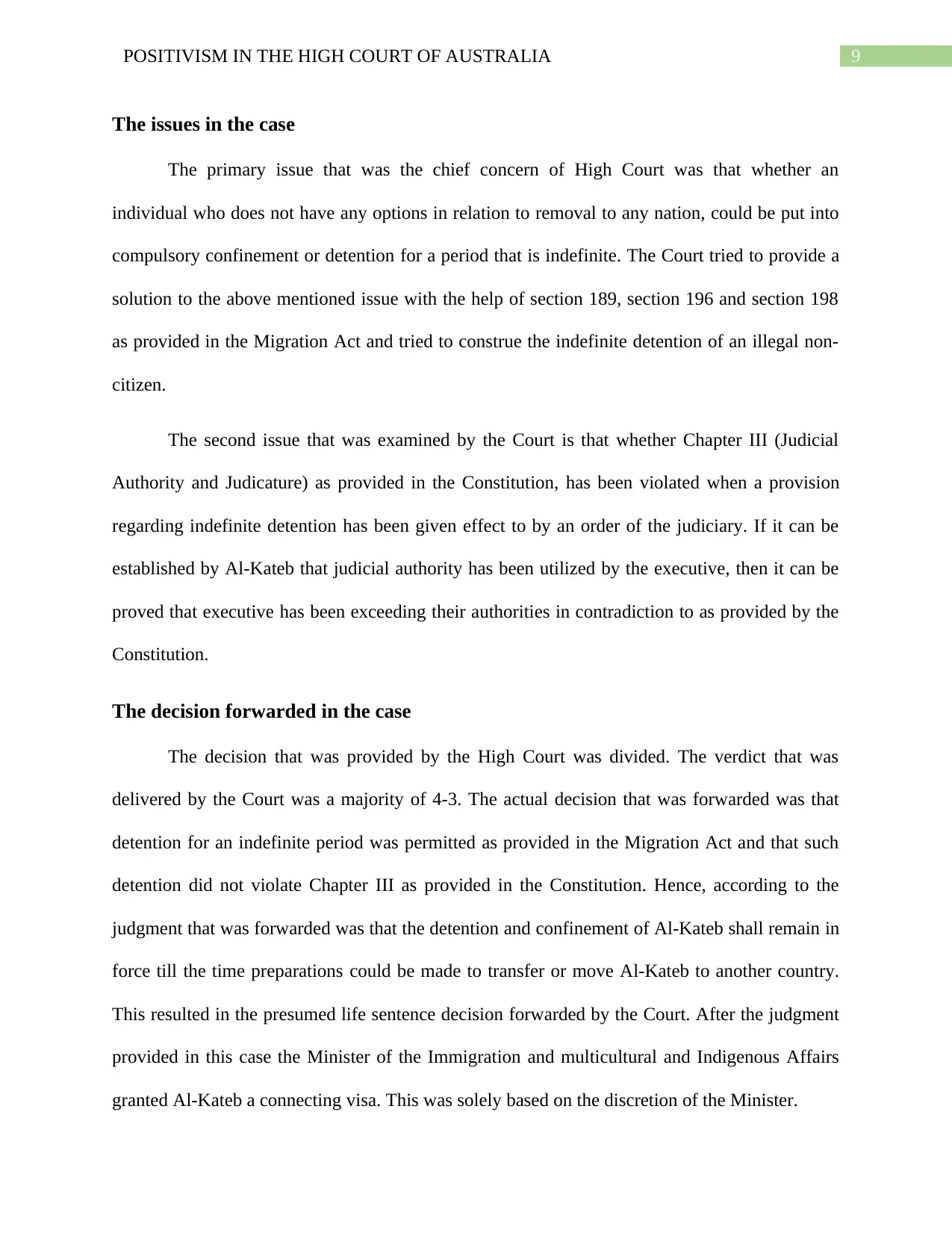
9POSITIVISM IN THE HIGH COURT OF AUSTRALIA
The issues in the case
The primary issue that was the chief concern of High Court was that whether an
individual who does not have any options in relation to removal to any nation, could be put into
compulsory confinement or detention for a period that is indefinite. The Court tried to provide a
solution to the above mentioned issue with the help of section 189, section 196 and section 198
as provided in the Migration Act and tried to construe the indefinite detention of an illegal non-
citizen.
The second issue that was examined by the Court is that whether Chapter III (Judicial
Authority and Judicature) as provided in the Constitution, has been violated when a provision
regarding indefinite detention has been given effect to by an order of the judiciary. If it can be
established by Al-Kateb that judicial authority has been utilized by the executive, then it can be
proved that executive has been exceeding their authorities in contradiction to as provided by the
Constitution.
The decision forwarded in the case
The decision that was provided by the High Court was divided. The verdict that was
delivered by the Court was a majority of 4-3. The actual decision that was forwarded was that
detention for an indefinite period was permitted as provided in the Migration Act and that such
detention did not violate Chapter III as provided in the Constitution. Hence, according to the
judgment that was forwarded was that the detention and confinement of Al-Kateb shall remain in
force till the time preparations could be made to transfer or move Al-Kateb to another country.
This resulted in the presumed life sentence decision forwarded by the Court. After the judgment
provided in this case the Minister of the Immigration and multicultural and Indigenous Affairs
granted Al-Kateb a connecting visa. This was solely based on the discretion of the Minister.
The issues in the case
The primary issue that was the chief concern of High Court was that whether an
individual who does not have any options in relation to removal to any nation, could be put into
compulsory confinement or detention for a period that is indefinite. The Court tried to provide a
solution to the above mentioned issue with the help of section 189, section 196 and section 198
as provided in the Migration Act and tried to construe the indefinite detention of an illegal non-
citizen.
The second issue that was examined by the Court is that whether Chapter III (Judicial
Authority and Judicature) as provided in the Constitution, has been violated when a provision
regarding indefinite detention has been given effect to by an order of the judiciary. If it can be
established by Al-Kateb that judicial authority has been utilized by the executive, then it can be
proved that executive has been exceeding their authorities in contradiction to as provided by the
Constitution.
The decision forwarded in the case
The decision that was provided by the High Court was divided. The verdict that was
delivered by the Court was a majority of 4-3. The actual decision that was forwarded was that
detention for an indefinite period was permitted as provided in the Migration Act and that such
detention did not violate Chapter III as provided in the Constitution. Hence, according to the
judgment that was forwarded was that the detention and confinement of Al-Kateb shall remain in
force till the time preparations could be made to transfer or move Al-Kateb to another country.
This resulted in the presumed life sentence decision forwarded by the Court. After the judgment
provided in this case the Minister of the Immigration and multicultural and Indigenous Affairs
granted Al-Kateb a connecting visa. This was solely based on the discretion of the Minister.
Paraphrase This Document
Need a fresh take? Get an instant paraphrase of this document with our AI Paraphraser
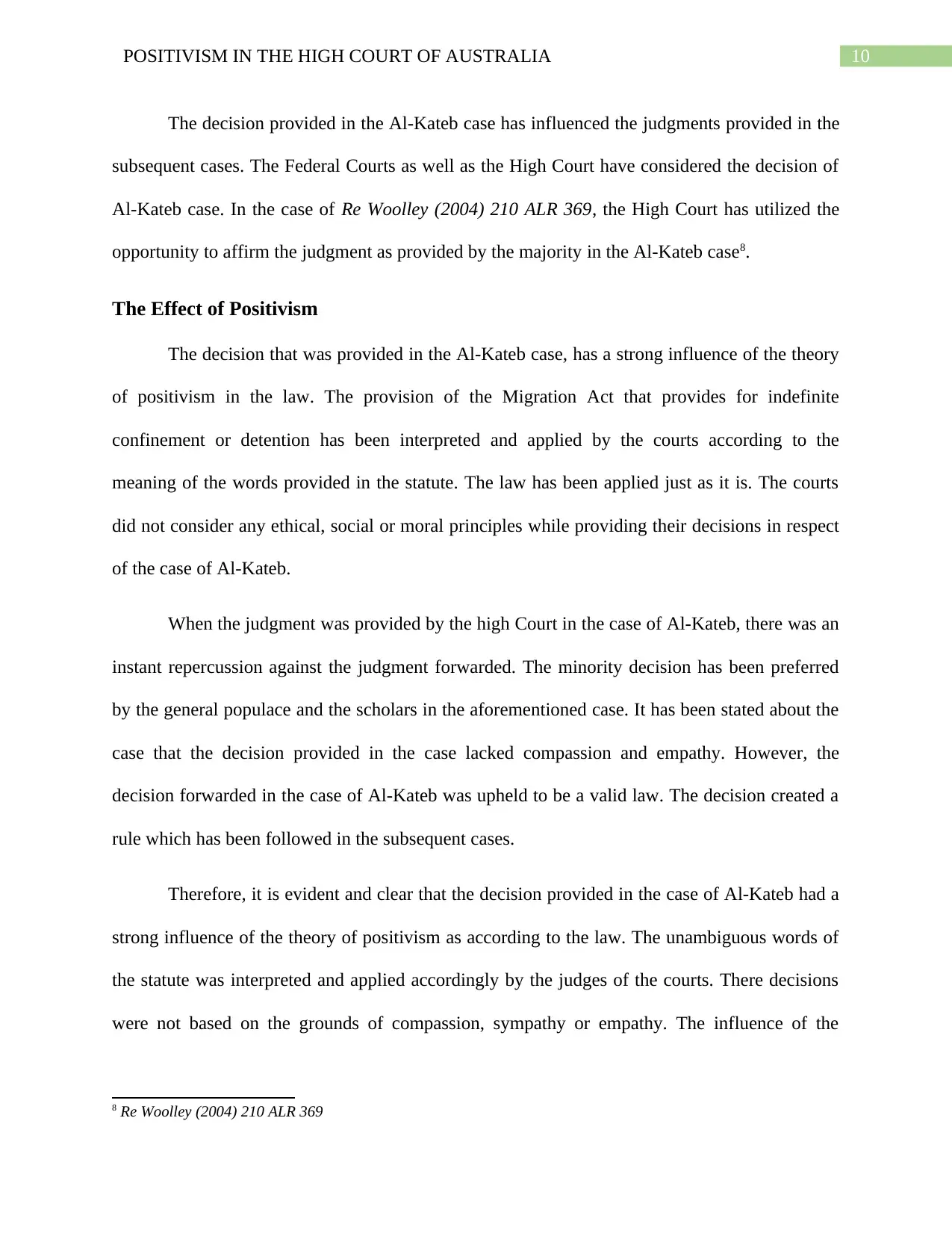
10POSITIVISM IN THE HIGH COURT OF AUSTRALIA
The decision provided in the Al-Kateb case has influenced the judgments provided in the
subsequent cases. The Federal Courts as well as the High Court have considered the decision of
Al-Kateb case. In the case of Re Woolley (2004) 210 ALR 369, the High Court has utilized the
opportunity to affirm the judgment as provided by the majority in the Al-Kateb case8.
The Effect of Positivism
The decision that was provided in the Al-Kateb case, has a strong influence of the theory
of positivism in the law. The provision of the Migration Act that provides for indefinite
confinement or detention has been interpreted and applied by the courts according to the
meaning of the words provided in the statute. The law has been applied just as it is. The courts
did not consider any ethical, social or moral principles while providing their decisions in respect
of the case of Al-Kateb.
When the judgment was provided by the high Court in the case of Al-Kateb, there was an
instant repercussion against the judgment forwarded. The minority decision has been preferred
by the general populace and the scholars in the aforementioned case. It has been stated about the
case that the decision provided in the case lacked compassion and empathy. However, the
decision forwarded in the case of Al-Kateb was upheld to be a valid law. The decision created a
rule which has been followed in the subsequent cases.
Therefore, it is evident and clear that the decision provided in the case of Al-Kateb had a
strong influence of the theory of positivism as according to the law. The unambiguous words of
the statute was interpreted and applied accordingly by the judges of the courts. There decisions
were not based on the grounds of compassion, sympathy or empathy. The influence of the
8 Re Woolley (2004) 210 ALR 369
The decision provided in the Al-Kateb case has influenced the judgments provided in the
subsequent cases. The Federal Courts as well as the High Court have considered the decision of
Al-Kateb case. In the case of Re Woolley (2004) 210 ALR 369, the High Court has utilized the
opportunity to affirm the judgment as provided by the majority in the Al-Kateb case8.
The Effect of Positivism
The decision that was provided in the Al-Kateb case, has a strong influence of the theory
of positivism in the law. The provision of the Migration Act that provides for indefinite
confinement or detention has been interpreted and applied by the courts according to the
meaning of the words provided in the statute. The law has been applied just as it is. The courts
did not consider any ethical, social or moral principles while providing their decisions in respect
of the case of Al-Kateb.
When the judgment was provided by the high Court in the case of Al-Kateb, there was an
instant repercussion against the judgment forwarded. The minority decision has been preferred
by the general populace and the scholars in the aforementioned case. It has been stated about the
case that the decision provided in the case lacked compassion and empathy. However, the
decision forwarded in the case of Al-Kateb was upheld to be a valid law. The decision created a
rule which has been followed in the subsequent cases.
Therefore, it is evident and clear that the decision provided in the case of Al-Kateb had a
strong influence of the theory of positivism as according to the law. The unambiguous words of
the statute was interpreted and applied accordingly by the judges of the courts. There decisions
were not based on the grounds of compassion, sympathy or empathy. The influence of the
8 Re Woolley (2004) 210 ALR 369
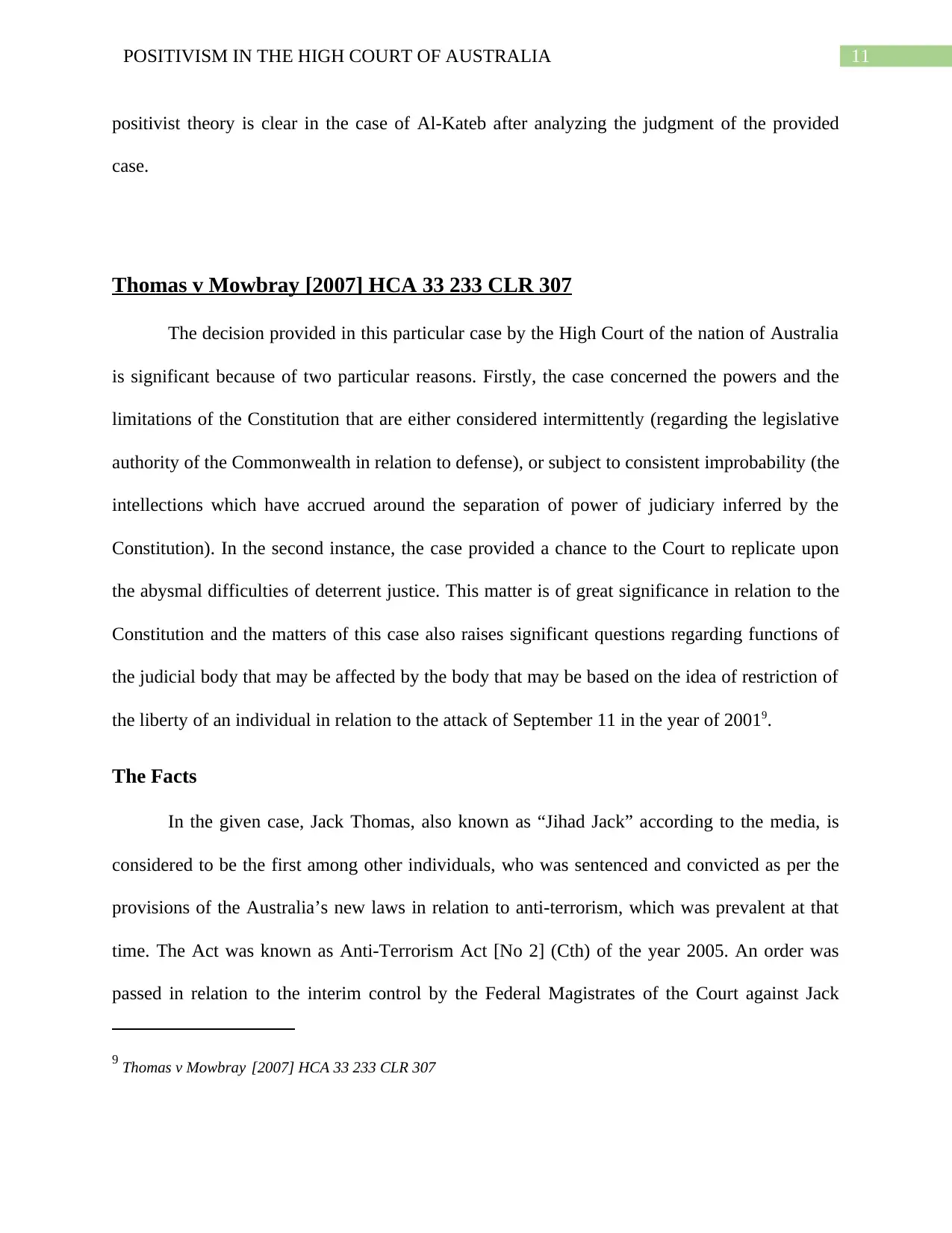
11POSITIVISM IN THE HIGH COURT OF AUSTRALIA
positivist theory is clear in the case of Al-Kateb after analyzing the judgment of the provided
case.
Thomas v Mowbray [2007] HCA 33 233 CLR 307
The decision provided in this particular case by the High Court of the nation of Australia
is significant because of two particular reasons. Firstly, the case concerned the powers and the
limitations of the Constitution that are either considered intermittently (regarding the legislative
authority of the Commonwealth in relation to defense), or subject to consistent improbability (the
intellections which have accrued around the separation of power of judiciary inferred by the
Constitution). In the second instance, the case provided a chance to the Court to replicate upon
the abysmal difficulties of deterrent justice. This matter is of great significance in relation to the
Constitution and the matters of this case also raises significant questions regarding functions of
the judicial body that may be affected by the body that may be based on the idea of restriction of
the liberty of an individual in relation to the attack of September 11 in the year of 20019.
The Facts
In the given case, Jack Thomas, also known as “Jihad Jack” according to the media, is
considered to be the first among other individuals, who was sentenced and convicted as per the
provisions of the Australia’s new laws in relation to anti-terrorism, which was prevalent at that
time. The Act was known as Anti-Terrorism Act [No 2] (Cth) of the year 2005. An order was
passed in relation to the interim control by the Federal Magistrates of the Court against Jack
9 Thomas v Mowbray [2007] HCA 33 233 CLR 307
positivist theory is clear in the case of Al-Kateb after analyzing the judgment of the provided
case.
Thomas v Mowbray [2007] HCA 33 233 CLR 307
The decision provided in this particular case by the High Court of the nation of Australia
is significant because of two particular reasons. Firstly, the case concerned the powers and the
limitations of the Constitution that are either considered intermittently (regarding the legislative
authority of the Commonwealth in relation to defense), or subject to consistent improbability (the
intellections which have accrued around the separation of power of judiciary inferred by the
Constitution). In the second instance, the case provided a chance to the Court to replicate upon
the abysmal difficulties of deterrent justice. This matter is of great significance in relation to the
Constitution and the matters of this case also raises significant questions regarding functions of
the judicial body that may be affected by the body that may be based on the idea of restriction of
the liberty of an individual in relation to the attack of September 11 in the year of 20019.
The Facts
In the given case, Jack Thomas, also known as “Jihad Jack” according to the media, is
considered to be the first among other individuals, who was sentenced and convicted as per the
provisions of the Australia’s new laws in relation to anti-terrorism, which was prevalent at that
time. The Act was known as Anti-Terrorism Act [No 2] (Cth) of the year 2005. An order was
passed in relation to the interim control by the Federal Magistrates of the Court against Jack
9 Thomas v Mowbray [2007] HCA 33 233 CLR 307
⊘ This is a preview!⊘
Do you want full access?
Subscribe today to unlock all pages.

Trusted by 1+ million students worldwide
1 out of 16
Related Documents
Your All-in-One AI-Powered Toolkit for Academic Success.
+13062052269
info@desklib.com
Available 24*7 on WhatsApp / Email
![[object Object]](/_next/static/media/star-bottom.7253800d.svg)
Unlock your academic potential
Copyright © 2020–2026 A2Z Services. All Rights Reserved. Developed and managed by ZUCOL.




